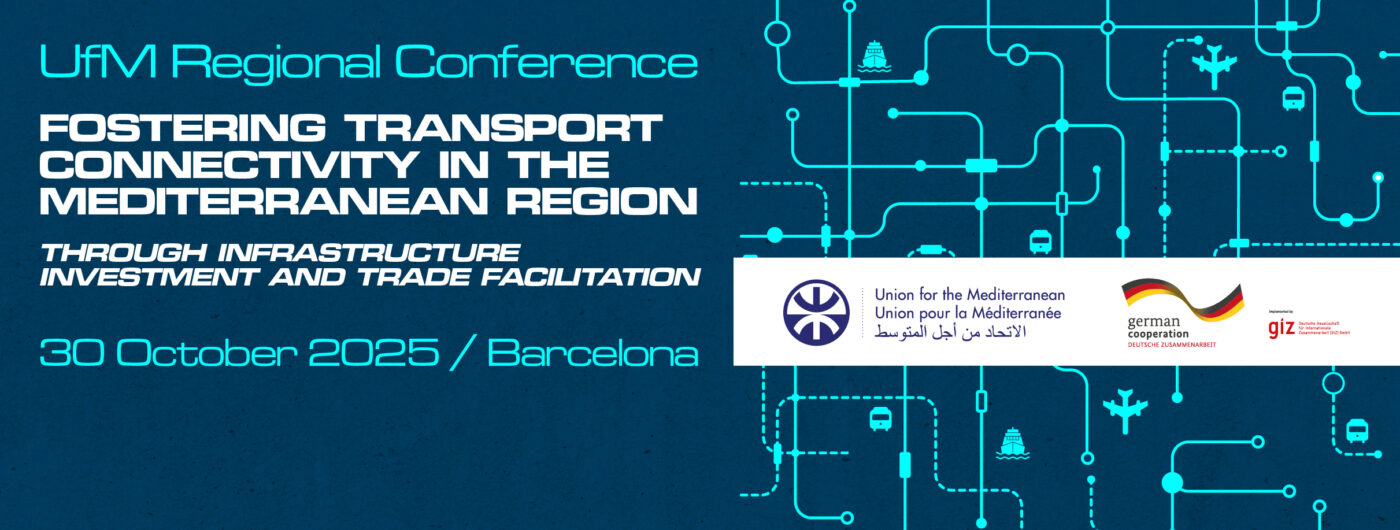
UfM Regional Conference – Fostering transport connectivity in the Mediterranean region through infrastructure investment and trade facilitation – A Strategic Conversation in an Era of Geopolitical Shifts
This event has been postponed.
Transport connectivity remains paramount in today’s globalised economy, acting as the “lifeblood” of economies and playing a crucial role in connecting regions and ensuring efficient mobility for people and goods. In a world marked by increasing volatility and geopolitical shifts, better connectivity is fundamental for catching-up economies to increase competitiveness, promote regional integration, reduce trade costs, and accelerate integration into global value chains, thereby strengthening their position in global production and trade networks and mitigating dependencies. High levels of transport connectivity also lead to improved access to employment, education, health, and other public services, as well as tourism activities, raising productivity and promoting economic and social development.
The Mediterranean Sea has historically been a crossroads and remains central to global challenges today. The Union for the Mediterranean (UfM) has consistently prioritised regional integration, interdependence, and interconnections since 1995. This commitment was significantly reinforced by the 2023 Ministerial Declaration on Transport and a new UfM Regional Transport Action Plan (RTAP) until 2027, which established commitments to developing sustainable, resilient, and inclusive transport infrastructure. This includes both regulatory reform and the establishment of the future Trans-Mediterranean Transport Network (TMN-T), to be connected with the Trans-European Transport Network (TEN-T), and potentially extending to inner Africa and Asia.
Despite these efforts, significant barriers persist in the region, presenting dilemmas and trade-offs in the current geo-economic landscape. Transport infrastructure connectivity, especially in the Southern and Eastern Mediterranean, is often insufficient or incomplete, and the level of investment is not enough to meet growing needs. The region’s transport connectivity remains heavily dependent on road infrastructure, highlighting a need for diversified, multimodal networks that integrate rail and maritime routes to enhance resilience and de-risk supply chains. Non-physical “soft” barriers, such as delays at ports and borders, inefficient customs procedures, and lack of standardisation, also negatively impact global trade and logistics performance.
The transport sector also faces an investment gap, particularly in Southern and Eastern Mediterranean countries, where infrastructure development is underfunded. Foreign Direct Investment (FDI) in the transport sector faces regulatory restrictions in some of these countries, despite some recent reforms. Addressing this investment gap by mobilising private participation is, therefore, a critical focus.
The European Union’s external dimension policies acknowledge transport as international by nature, playing a crucial role in connecting the EU with its neighbours and contributing significantly to economic prosperity. The EU seeks to assert its transport agenda globally, promoting its regulatory, economic, and technical strengths. Initiatives like the Global Gateway underscore the EU’s commitment to supporting third countries in infrastructure development, including the extension of the TEN-T, by fostering mutually beneficial cooperation with partners..
This Regional Conference aims to address these challenges and foster a more integrated, efficient, and sustainable transport system across the Mediterranean region.

